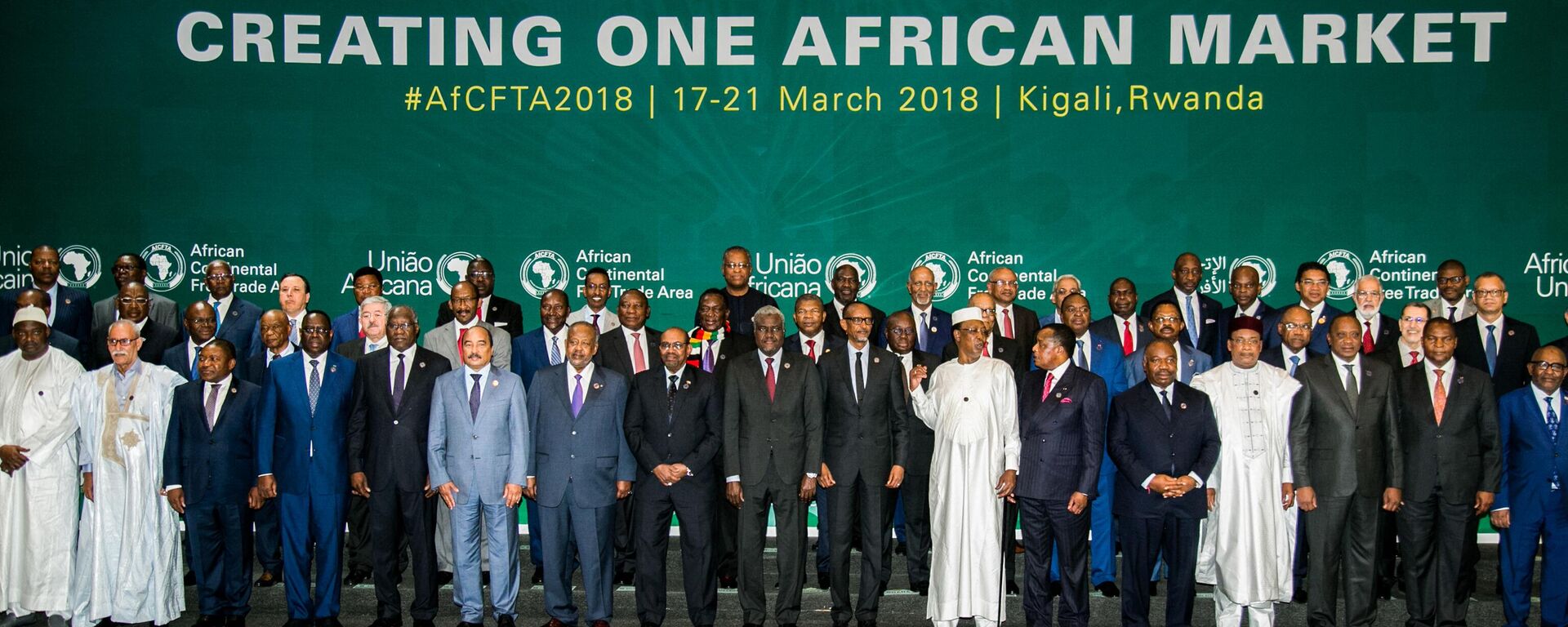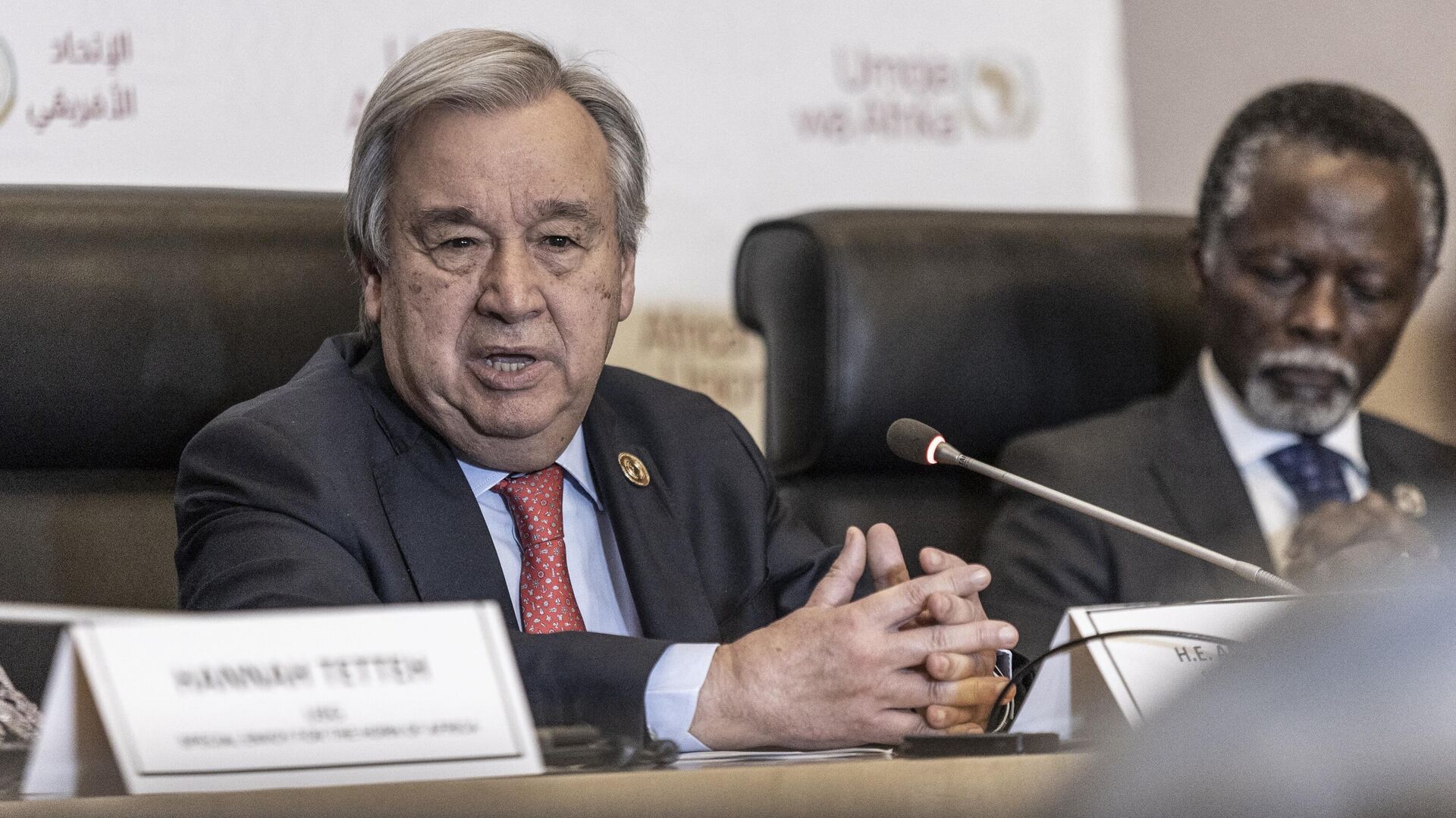https://sputnikglobe.com/20230218/african-states-turned-down-on-debt-relief--forced-to-pay-extortionate-rates-un-chief-says-1107578795.html
African States Turned Down on Debt Relief & Forced to Pay 'Extortionate' Rates, UN Chief Says
African States Turned Down on Debt Relief & Forced to Pay 'Extortionate' Rates, UN Chief Says
Sputnik International
Debt-laden African countries are forced into an unfair deal by the international financial system, which turns them down on debt relief and charges them "extortionate" interest rates, the UN chief Antonio Guterres has stated.
2023-02-18T15:05+0000
2023-02-18T15:05+0000
2023-02-18T15:05+0000
africa
east africa
ethiopia
addis ababa
african union (au)
cooperation
regional cooperation
finance
debt relief
debt restructuring
https://cdn1.img.sputnikglobe.com/img/07e7/02/12/1107578304_0:161:3071:1888_1920x0_80_0_0_5594fb1920d58246e7ced332e089674a.jpg
Debt-laden African countries are forced into unfair deals by the international financial system, which turns them down on debt relief and charges "extortionate" interest rates, the UN Secretary-General Antonio Guterres has stated. The UN chief delivered his remarks at the opening ceremony of the annual African Union summit, starting with the notion that Africa has achieved significant progress so far in terms of development. However, he stressed that action is still needed for Africa, namely "economic action." According to Guterres, Africa is particularly rich in potential, which can't be said for global support. Investing in Africa's "pathways to prosperity requires finance," he underlined, recalling that African countries are repeatedly abandoned and neglected by global financial institutions. In his address to the assembly, he called for far-reaching reforms aimed at altering the very structure of international finance to make it beneficial for developing countries, especially those in Africa, and transform it to serve the interests of the most vulnerable. He stated that the world needs a "new debt architecture that provides debt relief and restructuring" to the countries with a heavy debt burden.The lingering effects of the COVID-19 pandemic, exacerbated by recent global turbulence, climate change consequences and financial difficulties, have severely hit African countries pushing them to the brink of or directly into debt distress. According to IMF estimates, public debt ratios in sub-Saharan Africa are at their highest in over two decades. Many African nations have seen their debt indicators worsen in recent years.Meanwhile, several countries sought debt restructuring deals under an IMF program, including Chad, Ethiopia, Somalia and Zambia. The program is designed to help the most affected low-income countries address the crisis and maintain long-term economic and financial stability.Guterres highlighted that all these factors, mainly growing and unbearable debt burdens, substantially hampered African countries' ability to invest in critical areas like health or education, while the most vulnerable are women and children. According to Guterres, African nations can't provide these areas with sufficient investments, and at the same time they can't "climb the development ladder with one hand tied behind their backs." In this regard, he stated that they should have a greater voice in global institutions, including financial institutions, to advance their needs and interests at the global stage. During the ceremony, Ethiopian Prime Minister Abiy Ahmed echoed the call, saying that all states on the continent wish to put their economies "back on a growth trajectory." However, he added, it would be difficult without restructuring aimed at making their external debt sustainable. The speakers of the summit also focused on other pressing issues seen on the continent, in particular, worsening food and security crises. Due to armed conflicts and extreme weather conditions in the Sahel region, as well as in the Horn of Africa, many people were forced to leave their homes, while thousands are suffering from food shortages. To provide assistance to those in need, Guterres announced "the largest-ever allocation from the UN Central Emergency Response Fund." He noted that the organization will spend $250 million to address "forgotten crises" around the world and help communities that are now on the brink of famine in Africa.
https://sputnikglobe.com/20230217/free-trade-area-and-insecurity-key-points-of-upcoming-african-union-leaders-summit-1107531582.html
africa
east africa
ethiopia
addis ababa
Sputnik International
feedback@sputniknews.com
+74956456601
MIA „Rossiya Segodnya“
2023
News
en_EN
Sputnik International
feedback@sputniknews.com
+74956456601
MIA „Rossiya Segodnya“
Sputnik International
feedback@sputniknews.com
+74956456601
MIA „Rossiya Segodnya“
united nation's secretary-general antonio guterres, 36th ordinary session of the assembly of the african union (au), addis ababa, ethiopia, debt relief, debt burden, debt restructuring
united nation's secretary-general antonio guterres, 36th ordinary session of the assembly of the african union (au), addis ababa, ethiopia, debt relief, debt burden, debt restructuring
African States Turned Down on Debt Relief & Forced to Pay 'Extortionate' Rates, UN Chief Says
The 36th African Union (AU) Summit kicked off on Saturday at the headquarters of the organization in Addis Ababa, Ethiopia, bringing together African leaders from across the continent, as well as leading international figures. The participants are discussing various regional issues, mainly focusing on economy and persisting financial constraints.
Debt-laden African countries are forced into unfair deals by the international financial system, which turns them down on debt relief and charges "extortionate" interest rates, the UN Secretary-General Antonio Guterres has stated.
"The global financial system routinely denies them [developing countries] debt relief and concessional financing while charging extortionate interest rates," he said.
The UN chief delivered his remarks at the opening ceremony of the annual African Union summit, starting with the notion that Africa has achieved significant progress so far in terms of development. However, he stressed that action is still needed for Africa, namely "economic action."
According to Guterres, Africa is particularly rich in potential, which can't be said for global support. Investing in Africa's "pathways to prosperity requires finance," he underlined, recalling that African countries are repeatedly abandoned and neglected by global financial institutions.
In his address to the assembly, he called for far-reaching reforms aimed at altering the very structure of international finance to make it beneficial for developing countries, especially those in Africa, and transform it to serve the interests of the most vulnerable. He stated that the world needs a "new debt architecture that provides debt relief and restructuring" to the countries
with a heavy debt burden."I’ve called [...] to radically transform the global financial architecture. The beating heart of the system, the every decision mechanism and process should be centered in the needs of developing countries," Guterres emphasized.
The lingering effects of the COVID-19 pandemic, exacerbated by recent global turbulence, climate change consequences and financial difficulties, have severely hit African countries pushing them to the brink of or directly into debt distress. According to
IMF estimates, public debt ratios in sub-Saharan Africa are at their highest in over two decades. Many African nations have seen their debt indicators worsen in recent years.
Meanwhile, several countries sought debt restructuring deals under an IMF program, including Chad, Ethiopia, Somalia and
Zambia. The program is designed to help the most affected low-income countries address the crisis and
maintain long-term economic and financial stability.
Guterres highlighted that all these factors, mainly growing and unbearable debt burdens, substantially hampered African countries' ability to invest in critical areas like health or education, while the most vulnerable are women and children.
"Vital systems are starved of investment - from health and education to green technology, social protection and the creation of new sustainable jobs [...]. Women and girls are still not receiving the support and investment they need," the UN chief said.
According to Guterres, African nations can't provide these areas with sufficient investments, and at the same time they can't "climb the development ladder with one hand tied behind their backs." In this regard, he stated that they should have a greater voice in global institutions, including financial institutions, to advance their needs and interests at the global stage.
During the ceremony, Ethiopian Prime Minister Abiy Ahmed echoed the call, saying that all states on the continent wish to put their economies "back on a growth trajectory." However, he added, it would be difficult without restructuring aimed at making their external debt sustainable.

17 February 2023, 10:16 GMT
The speakers of the summit also focused on other pressing issues seen on the continent, in particular, worsening food and security crises. Due to armed conflicts and extreme weather conditions in the Sahel region, as well as in the Horn of Africa, many people were forced to leave their homes, while
thousands are suffering from food shortages.
To provide assistance to those in need, Guterres announced "the largest-ever allocation from the UN Central Emergency Response Fund." He noted that the organization will spend $250 million to address "forgotten crises" around the world and help communities that are now on the brink of famine in Africa.



